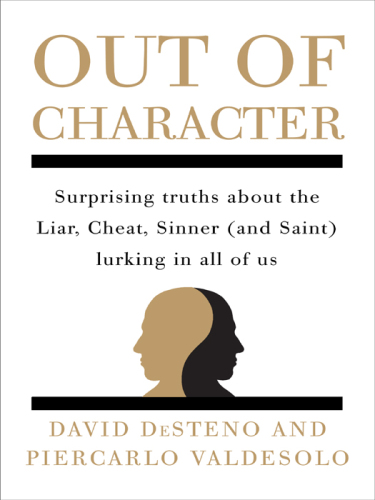
Out of Character
Surprising Truths About the Liar, Cheat, Sinner (and Saint) Lurking in All of Us
فرمت کتاب
ebook
تاریخ انتشار
2011
نویسنده
Piercarlo Valdesoloناشر
Harmony/Rodaleشابک
9780307717771
کتاب های مرتبط
- اطلاعات
- نقد و بررسی
- دیدگاه کاربران
نقد و بررسی

March 21, 2011
While we think of "character" as fairly formed by adolescence, DeSteno and Valdesolo, psychology professors respectively at Northwestern and Amherst, show that it is anything but. Rather, they say, character is somewhat fluid, sometimes seeking short-term self-interest, sometimes long-term self-interest, and changing according to emotions and circumstance. The authors, report on experiments in which they and colleagues have looked at seven major areas of character: hypocrisy vs. morality, love vs. lust, pride vs. hubris, compassion vs. cruelty, fairness vs. unfairness, playing it safe vs. risk-taking, and tolerance vs. bigotry. Their often fascinating results show, for example, in risk-taking experiments, that the subjects were more likely to take risks when the winners' rewards (in this case, freshly baked chocolate chip cookies) were present in the room during the game. Clearly and succinctly, and marshaling varied and colorful evidence, the authors demonstrate that most of us can be either "saints" or "sinners," but usually operate on a continuum between these extremes. People who seem to act "out of character," then, may simply be expressing a previously latent character trait that makes short-term psychological sense for them in a particular circumstance.

February 15, 2011
Psychologists DeSteno (Psychology/Northeastern Univ.) and Valdesolo (Psychology/Amherst Coll.) offer a new twist to the dispute between absolute and relative moral values.
The authors use the metaphor of the ant and the grasshopper—taken from an Aesop fable—to describe two contradictory aspects of human behavior which are triggered by different neurological systems in the brain. "The ant is always looking to the future," they write. "The grasshopper, on the other hand, sees no point in worrying about the future until it gets here, so it spends its time singing, playing, and enjoying itself." The ant represents our ability to exercise self-control, to reason and plan ahead; the grasshopper represents the urge for immediate gratification and our dependence on intuitive, gut reactions. Counterintuitively, the authors suggest that the peccadilloes of public figures such as Eliot Spitzer and Larry Craig might exemplify cognitive flexibility rather than hypocrisy and contempt for the moral values they publicly espoused—a mental shift to suit other imperatives. The more primitive grasshopper system that governs our instinctive behavior harkens back to our evolutionary past, when survival depended upon a quick reaction to danger. DeSteno and Valdesolo review cutting-edge research using fMRI, neuroimaging that shows how different brain systems can be activated when we face moral dilemmas. In one experiment, subjects were asked how they would respond to a hypothetical situation in which an out-of-control trolley was about to run over five people. Would they stop the trolley by pushing a large man onto the tracks? Others were given the option of flipping a switch to shift the trolley to another track, where only one person would be hurt. The fMRI image showed that different areas of the brain were activated: In the first case, a gut reaction against killing had to be overcome; in the second, the brain treated it as a logical decision.
A well-reasoned argument for a more nuanced view of character, and a solid addition to the ever-growing behavioral-economics shelf.
(COPYRIGHT (2011) KIRKUS REVIEWS/NIELSEN BUSINESS MEDIA, INC. ALL RIGHTS RESERVED.)

























دیدگاه کاربران